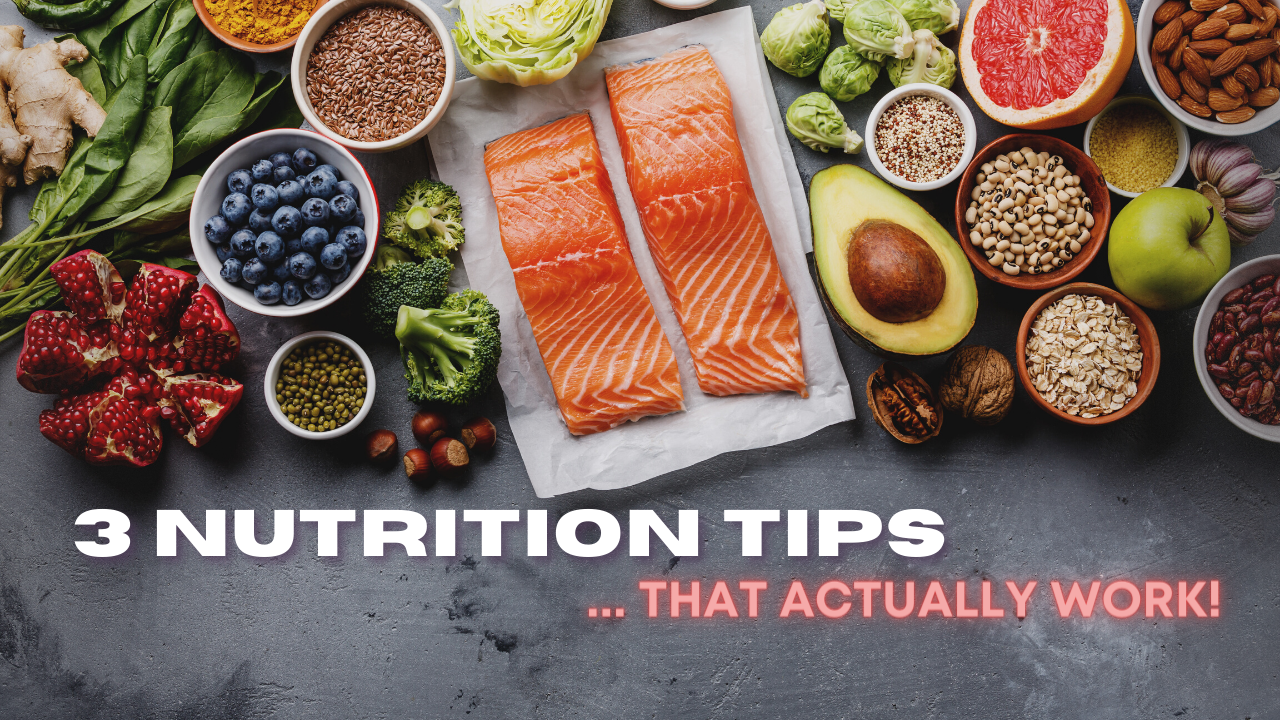
3 Nutrition Tips That Actually Work
Nov 01, 2021NUTRITION is THE thing our clients most often say they want to change but struggle the most to address. And for good reason...
What you put in your mouth is IMPORTANT!
Nutrition dictates your energy throughout the day, how well you sleep at night, the success of your exercise program, your mood, your ability to focus, and so much more.
Have you ever said :
"I'm tired all the time."
"I'm eating the right things, but nothing's changing."
"I should eat fewer carbs."
"I'm addicted to sugar."
"Should I track my calories?"
"I KNOW what to eat, it's just really hard when I get home at night."
A quick note on weight loss: After more than a decade in the fitness industry, we've seen a lot of studies, diets, meal plans, supplements and guilt trips... usually sold as a quick option to lose weight or get lean. Honestly : there are proven ways to lose weight and get lean fast. Statistically, though, over 90% of people who dieted to lose weight gained it back in less than three years. I'd even take it a step further and assume those dieters also lost some faith in themselves and trained their brains to distrust food. It's OK to want to change and feel amazing. It's OK to want to be just as you are now! Just remember that you can't borrow from your metabolism and not pay it back later.
Learn more about weight loss in our 2 part series: Does Weight Loss Matter Part 1 and Does Weight Loss Matter Part 2
The best way to build a long-term relationship with yourself, enjoy food (all food! even donuts!) and create metabolic resilience is to create small, repeatable changes and pay attention to both your objective (measurable) and subjective (observable) responses.
Here are the three nutrition shifts that work for me time and time again when I am seeking change:
1. Track your food, but don't make a big deal about it. Gather some data without telling stories about it. Find out what are you ACTUALLY eating and whether it lines up with your perception. Ignore the calories / macro info for about a week so you don't "adjust" to make it look good. Get CLEAN data about your habits. When you catch yourself telling stories about what you *should* do or what your food says about you:
- Stop.
- Take a breath.
- Remember that this is purely scientific data.
- Do something nice for yourself as a thank you for tracking and learning!
2. Notice your response to food. When you eat a certain type of food or meal, does it make you warm and sleepy? Cold and jittery? Energized and engaged? Make a note of what foods work well for your body, leaving you warm and energized, and which need to be paired with other foods or skipped. You can even gather objective data on this by measuring your heart rate and body temperature!
3. Plan ahead. Make a list of the foods that made you warm and energized. Shop and batch cook on the weekend. Pack your meals the night before so you can grab and go in the morning. If you know cooking isn't an option and you need to eat out: pack a few emergency snacks, plan a non-negotiable break into your day and be sure to buy before you're too hungry to make good choices.
Long term relationship-building of any kind is an exercise in patience, paying attention and making small, loving adjustments - your nutrition is no exception.
Are you ready to build a better relationship to food? Set up a totally no-pressure, totally free strategy session with one of our expert coaches. We're here for you.
For an additional resource, we highly recommend the book Lean and Strong: Eating Skills, Psychology, and Workouts by Josh Hillis for a practical, well-researched, and compassionate take on nutrition... that actually works!
Don't miss a beat!
New moves, motivation, and classes delivered to your inbox.
We hate SPAM. We will never sell your information, for any reason.


